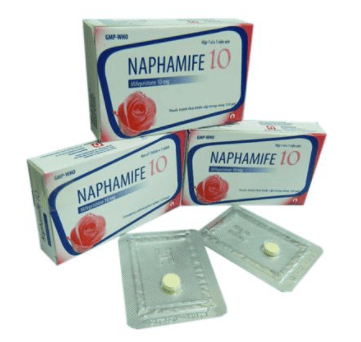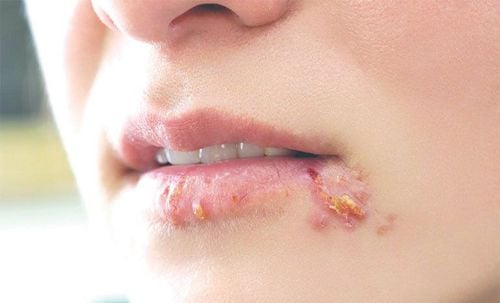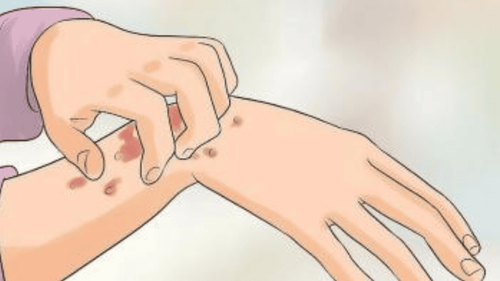This is an automatically translated article.
Congenital syphilis (English name is Congenital syphilis) occurs when a mother with syphilis passes the bacteria that cause the disease to her unborn baby during pregnancy. Therefore, pregnant women need to be tested for syphilis during pregnancy to protect their babies from this dangerous disease.
1. How does syphilis affect fetuses and newborns?
Syphilis has a great impact on the health of the fetus and the health of the mother depends on how long the mother has had the disease and has been treated or not.
For the unborn baby, syphilis can cause:
Miscarriage Stillbirth Preterm birth Low birth weight Death soon after birth Up to 40% of newborn deaths are due to preterm birth or infection in women untreated syphilis.
For babies born with syphilis it can cause:
Bone deformities Severe anemia Enlargement of the liver and spleen Jaundice of the skin and eyes Brain and nerve problems, such as blindness or deafness Meningitis Inflammation skin

Bệnh giang mai có thể lây từ mẹ sang con và ảnh hưởng xấu đến sức khỏe trẻ
2. Do all babies born with congenital syphilis have symptoms of syphilis?
It is possible that infants with congenital syphilis do not have any symptoms of the disease at birth. But if left untreated, babies can develop serious problems in the first few weeks after birth, but they can also happen years later.
For children who are not treated for congenital syphilis, which later progresses, the child may die from infection, retardation or convulsions.
3. Do I need to be tested for syphilis during pregnancy?
All pregnant women should be tested for syphilis at their first prenatal visit. If not done at your first visit, be sure to ask your doctor about testing for syphilis at your next visit. Some women should be screened multiple times throughout their pregnancy.
Pregnant women should note that, even if they have syphilis, they may not have any symptoms, so they do not know they have the disease. In addition, the symptoms of syphilis can be very mild or similar to those of other conditions. Testing is the only way to definitively confirm if you have syphilis.
4. Can syphilis be cured?
Syphilis can be treated and cured with antibiotics. If a woman tests positive for syphilis during pregnancy, it's best to get treatment right away. During the treatment, the mother and the fetus will be closely monitored by the doctor to ensure effective treatment.
5. How will the doctor know if a child has syphilis?
A doctor must consider a number of factors to determine if a baby has syphilis, including the mother's syphilis blood test results and, if previously diagnosed with syphilis, whether the mother has had syphilis. treatment during pregnancy. The doctor will also test your child's blood, do a physical exam, or do other tests, like a lumbar puncture or x-ray, to determine if your child has syphilis.
6. How are babies born with congenital syphilis treated?
Children with syphilis need to be treated immediately, otherwise the disease will progress to cause many dangerous complications. Depending on the results of the physical examination, the child may be treated with antibiotics at the hospital for up to 10 days. In some cases, just one shot of an antibiotic is needed.
In addition, children being treated for congenital syphilis need close care and monitoring to ensure the treatment is effective.

Trẻ có bệnh giang mai cần sự chăm sóc và điều trị cẩn thận
7. How to reduce the risk of children having congenital syphilis?
The fetus will not get syphilis if the mother does not have syphilis. There are two important things that a mother can do to protect her baby from congenital syphilis and other health problems associated with syphilis infections:
Get tested for syphilis at the first prenatal visit
During your first prenatal visit, you should actively ask your doctor about testing for syphilis. Women should have an open and honest conversation with their doctor about their symptoms or concerns about a sexually transmitted disease, including syphilis, and any medications that you may be taking. current use, sexual status, new or multiple sex partners. This information will help your doctor make appropriate testing recommendations, even if you have been tested for syphilis in the past but should still be tested again during pregnancy.
If you test positive for syphilis, you will be treated immediately, do not wait until your next prenatal visit. In addition, the pregnant woman's sexual partner should also be treated at the same time to prevent the woman from being re-infected in the future. Even after being cured, it is still possible to get infected again. For this reason, you and your sexual partners should continue to take steps to reduce the risk of re-infection.
Reduce your risk of syphilis before and during pregnancy
If you have sex, the following measures can reduce your chances of getting syphilis:
Have a faithful or long-term relationship with your husband/partner She was tested and confirmed that she did not have syphilis. Use condoms correctly during sex. Although condoms can prevent transmission of syphilis by preventing contact with sores, you should know that sometimes syphilis sores occur in areas not protected by condoms and if Contact with these sores can still transmit syphilis. Vinmec International General Hospital offers a package of Examination and Screening for social diseases to help customers detect diseases early and have effective treatment and prevent dangerous complications. The screening package for social diseases at Vinmec is for all ages, both men and women.
When registering for the Social Disease Screening Package, customers will receive: Dermatology specialist examination; Perform tests such as: HIV Ab rapid test, Chlamydia rapid test, Treponema pallidium rapid test, qualitative and quantitative Treponema pallidum TPHA test, bacteriological smear test and staining fungal test soi...
To register for examination and treatment at Vinmec International General Hospital, you can contact Vinmec Health System nationwide, or register online HERE.
Reference source: Cdc.gov
SEE ALSO:
Syphilis: Causes, transmission, signs to recognize Syphilis can be transmitted from mother to child through the placenta How is syphilis treated?













